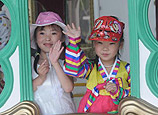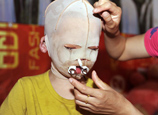
Care homes for seniors should take measures to treat residents' mental health, and may face fines or criminal charges if discrimination, abuse or other violations are discovered, according to draft regulations.
The draft regulations on nursing organizations for seniors state that nursing centers should provide psychological consultations for the elderly and cater to different individuals' needs rather than neglect their mental health.
The draft said nursing organizations will be fined up to 30,000 yuan ($4,890) if caregivers or other workers discriminate, humiliate, abuse or abandon senior residents. If their behavior breaks the law, they will be held responsible, the draft adds.
Public opinion on the draft is being solicited on the website of the Legislative Affairs Office of the State Council until June 23.
Wang Hui, director of the seniors' welfare division under the Ministry of Civil Affairs' department of social welfare and charity promotion, said the administrative regulations work as a supplement for the amended Law on the Protection of Rights and Interests of Seniors, which will take effect on July 1.
He said the regulations will boost the development of the nursing industry for the elderly and better protect seniors' rights.
The latest findings of the China Health and Retirement Longitudinal Study show 40 percent of seniors - an estimated 74 million Chinese people are aged 60 or older - feel depressed.
Results of the survey, which polled about 17,700 people from 28 provinces, show that nearly 48 percent of female senior respondents expressed a high level of depression symptoms, about 15 percentage points higher than their male counterparts.
The survey, jointly conducted by domestic and international academics, was released in Beijing on Friday.
Lin Xue, publicity official for the Love Delivery Care Center for Seniors, a nonprofit organization in Beijing dedicated to providing free psychological consultations for the elderly nationwide, said mental health problems are "a crucial problem" for seniors.
"We received about 15,000 calls from seniors last year. Many complained about loneliness, depression and some even discussed suicide attempts," she said.
Lin said there are complicated reasons behind seniors' passive feelings such as their spouses' extramarital affairs, sexual problems and loss of children.
Zhang Shufang, deputy director of a nursing home for the elderly in Beijing's Fengtai district, said she welcomes the government's move requiring nursing organizations to attach more importance to providing mental health care for the elderly.
"Mental care is as important as physical care to help seniors finish the last segment of their life journey with dignity and little pain," she said. "But it has long been ignored by many organizations."
Zhang said about 10 medical workers volunteered to give public lectures on mental health for the organizations' roughly 500 senior residents.
"Currently, we don't provide one-on-one counseling service because the elderly feel reluctant to pay for counseling and the government has not provided financial subsidies to help us to provide such services," she said.
She urged the government to subsidize nursing organizations and provide more training for their personnel to improve institutionalized seniors' mental health.


















![]()
